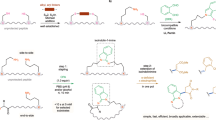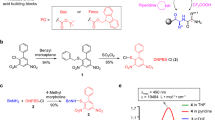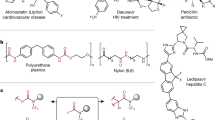Abstract
THE ‘carbobenzyloxy’ method of peptide synthesis1 has proved its value in many important syntheses. Nevertheless, the practical difficulties still encountered in this field suggest that improved protecting groups should still be sought. We have recently been examining benzyl chloroformates substituted in the benzene ring, and other closely related compounds, in the hope that the amino-acid and peptide derivatives might crystallize more readily and that other properties, such as stability and ease of removal of the protecting group, might differ in such a way as to increase the scope of this method of synthesis.
This is a preview of subscription content, access via your institution
Access options
Subscribe to this journal
Receive 51 print issues and online access
$199.00 per year
only $3.90 per issue
Buy this article
- Purchase on Springer Link
- Instant access to full article PDF
Prices may be subject to local taxes which are calculated during checkout
Similar content being viewed by others
References
Bergmann, M., and Zervas, L., Ber., 65, 1192 (1932).
Author information
Authors and Affiliations
Rights and permissions
About this article
Cite this article
CHANNING, D., TURNER, P. & YOUNG, G. Modified Carbobenzyloxy Groups in Peptide Synthesis. Nature 167, 487–488 (1951). https://doi.org/10.1038/167487a0
Issue Date:
DOI: https://doi.org/10.1038/167487a0
Comments
By submitting a comment you agree to abide by our Terms and Community Guidelines. If you find something abusive or that does not comply with our terms or guidelines please flag it as inappropriate.



